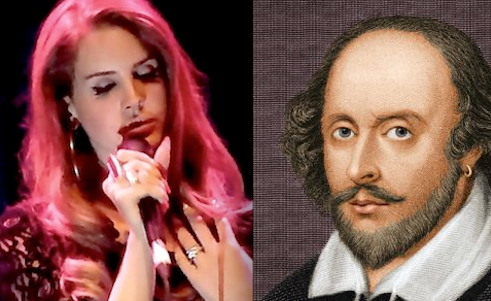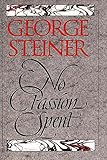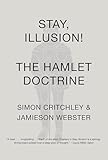
1.
Recently, Lynn Stuart Parramore tried to explain “Why a Death-Obsessed Pop Siren Is Perfect for Late-Stage Capitalist America.” She was referring, of course, to Lana Del Rey. Parramore explains that the Ultraviolence chanteuse is only the latest heir to a long lineage of decadent femmes fatales that rise to cultural prominence at moments of perilous social transition or imminent collapse:
This potent combination of women, sex and death is going to be one of the calling cards of late-stage capitalism. We are experiencing fearsome global dislocations and distorted social and economic systems that are killing our life-affirming instincts. The death drive is perennial, but when a society seems to hover on the eve of destruction, these Eves of the Apocalypse — suicidal brides, young women fixated on pain and death — emerge to speak our well-founded anxieties. They signal that just now, the death drive is very strong.
 Parramore’s thesis may not seem to have much to do with Ira Glass’s controversial assertion, tweeted after seeing a performance of King Lear, that, “Shakespeare sucks.” But when you consider that one of the late 19th century’s favorite sources of death-and-the-maiden imagery was the drowning Ophelia, weltering picturesquely among the strewn flowers of her fatal madness, the Shakespeare/Del Rey connection becomes more plausible. Just as Parramore (and others) criticize Lana Del Rey for social irresponsibility, for promoting an anti-feminist celebration of sadomasochistic sexuality and for embracing capitalist spectacle unto death, so the most persuasive and compelling attacks on Shakespeare have charged him with amoral aestheticism and a sensationalized skepticism about human potential.
Parramore’s thesis may not seem to have much to do with Ira Glass’s controversial assertion, tweeted after seeing a performance of King Lear, that, “Shakespeare sucks.” But when you consider that one of the late 19th century’s favorite sources of death-and-the-maiden imagery was the drowning Ophelia, weltering picturesquely among the strewn flowers of her fatal madness, the Shakespeare/Del Rey connection becomes more plausible. Just as Parramore (and others) criticize Lana Del Rey for social irresponsibility, for promoting an anti-feminist celebration of sadomasochistic sexuality and for embracing capitalist spectacle unto death, so the most persuasive and compelling attacks on Shakespeare have charged him with amoral aestheticism and a sensationalized skepticism about human potential.
2.
Ira Glass’s infamous tweet complained of King Lear that it had “no stakes” and was “not relatable.” Rebecca Mead and Adam Kirsch have explained at eloquent length why Glass’s expectation that Shakespeare be “relatable” is a naïve and even pernicious application of the narcissistic standards of advertising to serious art. But is Glass’s assertion that King Lear lacks “stakes” really so off the mark? This is a play in which traditional authority and the religious foundation on which it rests have collapsed into nothingness. Its villain, Edmund, worships no god but amoral nature, and its forlorn metaphysical conclusion is, in the words of the brutally blinded Gloucester, “As flies to wanton boys are we to the gods. / They kill us for their sport.” It’s not wrong to say that there are no stakes in the tragedy’s meaningless cosmos. At the play’s conclusion, a set of numb and chastened survivors mutter small consolations in a blasted landscape.
Turning the final page of ultraviolent King Lear in a literary anthology, you would expect it to be succeeded not by Milton’s Puritan justification of God’s ways to men or Pope’s Enlightenment assertion that, “Whatever is, is right,” but rather by the God-haunted and God-abandoned worlds of Kafka and Beckett. Shakespeare’s despairing modernity— — if by “modernity” we mean the collapse of all tradition and a resulting ontological insecurity — is uncanny, so uncanny that we can see elements of Lana Del Rey’s persona prefigured in Lear’s daughters: in the desperate and fatal sexual longings of Goneril and Regan, in the mysterious born-to-die intransigence of Cordelia.
3.
This sense of an after-the-deluge world gone wrong, a world where faith, hope, and love are powerless to improve the human condition, has long disturbed Shakespeare’s critics, most notoriously the poet Nahum Tate, whose happy-ending re-write of Lear held the English stage throughout the 18th century.
 But there are less moralistic ways to critique Shakespeare than Tate’s bowdlerization. In 1986, the brilliant polymath critic George Steiner gave a remarkable lecture called “A Reading against Shakespeare,” later collected in his No Passion Spent: Essays 1978-1995. In this densely learned paper, Steiner attempts to synthesize into a coherent and persuasive argument the complaints against Shakespeare made throughout modern history; he focuses particularly on the criticism of Leo Tolstoy and Ludwig Wittgenstein. Tolstoy and Wittgenstein, Steiner explains, implicitly relied on a concept of the poet as spiritual authority and moral prophet. For European thinkers of the 19th and early-20th centuries, it was not enough to be a prodigious coiner of words and creator of spectacle, as Shakespeare undoubtedly was:
But there are less moralistic ways to critique Shakespeare than Tate’s bowdlerization. In 1986, the brilliant polymath critic George Steiner gave a remarkable lecture called “A Reading against Shakespeare,” later collected in his No Passion Spent: Essays 1978-1995. In this densely learned paper, Steiner attempts to synthesize into a coherent and persuasive argument the complaints against Shakespeare made throughout modern history; he focuses particularly on the criticism of Leo Tolstoy and Ludwig Wittgenstein. Tolstoy and Wittgenstein, Steiner explains, implicitly relied on a concept of the poet as spiritual authority and moral prophet. For European thinkers of the 19th and early-20th centuries, it was not enough to be a prodigious coiner of words and creator of spectacle, as Shakespeare undoubtedly was:
Shakespeare is the incomparable Sprachchöpfer, the prodigal wordsmith, the limits of whose language are, in the idiom of the Tractatus, the limits of our world. There is scarcely a domain, constituent of men’s works and days, which Shakespeare has not harvested in language, over which he has not cast the encompassing net of his matchless lexical and grammatical wealth. Disposer of a vocabulary of almost thirty thousand words (Racine’s world is built of one tenth that number), Shakespeare, more than any other human being of whom we have certain record, has made the world at home in the word. This does not, however, make of him a Dichter, a truth-sayer, an explicitly moral agent, a visible teacher to and guardian of imperilled, bewildered mankind. An authentic Dichter, urges Wittgenstein, ‘cannot really say of himself, “I sing as the birds sing”—but perhaps Shakespeare could have said this of himself’ (Milton’s ‘warbling notes of wood-notes wild’ is fairly obviously present to Wittgenstein when he makes this suggestion). ‘I do not think that Shakespeare would have been able to reflect on the Dichterlos’ — a term again resistant to translation into English and into the entire register of Anglo-Saxon sensibility, but signifying something like the ‘calling’, ‘the destined ordnance’ of the poet.
 Because his plays express no sense of a nearly divine vocation, of a mission to save humanity by transmitting ethical truths, Shakespeare cannot be the equal of Dante or Milton or Goethe, of the Greek dramatists or the Russian novelists, all of whom wrote to commune with the divine and to bring light to the world. What had in the Romantic tradition long been seen as Shakespeare’s unique strength — what Keats famously called his “Negative Capability,” his capacity for “being in uncertainties, Mysteries, doubts, without any irritable reaching after fact & reason” — on this view becomes a liability, a social irresponsibility, a feckless acceptance of humanity’s doomed and ignorant lot without any attempt to improve it. Shakespeare can be seen as the paradigm of the apolitical artist, the dissolute aesthete reviled not only by the religious conservatives of all faiths but also by those who nurse radical political hopes, such as the anarcho-pacifist Tolstoy, the Soviet sympathizer Wittgenstein, and even the socialist-feminist Lynn Stuart Parramore. From this perspective, we find Shakespeare at the origin of that dangerously aloof aestheticism for which Roberto Bolaño’s By Night in Chile has given us the most memorable picture in contemporary letters: the literary soirée above the torture chamber.
Because his plays express no sense of a nearly divine vocation, of a mission to save humanity by transmitting ethical truths, Shakespeare cannot be the equal of Dante or Milton or Goethe, of the Greek dramatists or the Russian novelists, all of whom wrote to commune with the divine and to bring light to the world. What had in the Romantic tradition long been seen as Shakespeare’s unique strength — what Keats famously called his “Negative Capability,” his capacity for “being in uncertainties, Mysteries, doubts, without any irritable reaching after fact & reason” — on this view becomes a liability, a social irresponsibility, a feckless acceptance of humanity’s doomed and ignorant lot without any attempt to improve it. Shakespeare can be seen as the paradigm of the apolitical artist, the dissolute aesthete reviled not only by the religious conservatives of all faiths but also by those who nurse radical political hopes, such as the anarcho-pacifist Tolstoy, the Soviet sympathizer Wittgenstein, and even the socialist-feminist Lynn Stuart Parramore. From this perspective, we find Shakespeare at the origin of that dangerously aloof aestheticism for which Roberto Bolaño’s By Night in Chile has given us the most memorable picture in contemporary letters: the literary soirée above the torture chamber.
4.

 Accusing Shakespeare of reactionary politics is a longer tradition that one might expect; it certainly predates those deconstructionists, Marxists, postcolonialists, and feminists that the Bardolotarous Harold Bloom notoriously castigated as the “School of Resentment” in his Shakespeare: The Invention of the Human.
Accusing Shakespeare of reactionary politics is a longer tradition that one might expect; it certainly predates those deconstructionists, Marxists, postcolonialists, and feminists that the Bardolotarous Harold Bloom notoriously castigated as the “School of Resentment” in his Shakespeare: The Invention of the Human.
In Virginia Woolf’s Mrs. Dalloway, for instance, Shakespeare’s plays lure Septimus Warren Smith into the Great War to fight for an England he associates with the Bard’s poetic achievement. But after the war, the shell-shocked Smith discovers a different moral in Shakespeare:
Here he opened Shakespeare once more. That boy’s business of the intoxication of language — Antony and Cleopatra — had shrivelled utterly. How Shakespeare loathed humanity — the putting on of clothes, the getting of children, the sordidity of the mouth and the belly! This was now revealed to Septimus; the message hidden in the beauty of words. The secret signal which one generation passes, under disguise, to the next is loathing, hatred, despair. Dante the same. Aeschylus (translated) the same.
While other classic authors are implicated in Septimus’s very 20th-century sense that, “There is no document of civilization which is not at the same time a document of barbarism” (to quote Walter Benjamin), Shakespeare bears the brunt because he is the British icon whose poetic splendor tricked Septimus and his generation into fighting a nationalist and imperialist war that has destroyed their lives.

 In James Joyce’s Ulysses, Stephen Dedalus makes a similar case in his lecture on Hamlet in the National Library of Dublin. The young colonial intellectual sees Shakespeare as the poet of empire, anticipating the postcolonialist critics of P.C. academe by more than half a century. “Khaki Hamlets don’t hesitate to shoot,” Stephen bitterly observes of the British empire. Joyce’s autobiographical hero imagines the Elizabethan playwright as a litigious capitalist (Shakespeare was part-owner of his own theatrical company and of the Globe theater) who projected his avarice onto Shylock in a classic instance of anti-Semitism. Stephen even pictures Shakespeare as a money-minded hoarder of necessities during famine, an image of horrifying relevance to Ireland:
In James Joyce’s Ulysses, Stephen Dedalus makes a similar case in his lecture on Hamlet in the National Library of Dublin. The young colonial intellectual sees Shakespeare as the poet of empire, anticipating the postcolonialist critics of P.C. academe by more than half a century. “Khaki Hamlets don’t hesitate to shoot,” Stephen bitterly observes of the British empire. Joyce’s autobiographical hero imagines the Elizabethan playwright as a litigious capitalist (Shakespeare was part-owner of his own theatrical company and of the Globe theater) who projected his avarice onto Shylock in a classic instance of anti-Semitism. Stephen even pictures Shakespeare as a money-minded hoarder of necessities during famine, an image of horrifying relevance to Ireland:
— And the sense of property, Stephen said. He drew Shylock out of his own long pocket. The son of a maltjobber and moneylender he was himself a cornjobber and moneylender with ten tods of corn hoarded in the famine riots.
Stephen further speculates that Shakespeare’s nihilism was caused by wounded male pride, stemming from a betrayal by his wife, construed by the playwright/investor as yet another piece of his property:
But a man who holds so tightly to what he calls his rights over what he calls his debts will hold tightly also to what he calls his rights over her whom he calls his wife.
To sum up the political case against Shakespeare: his nihilism and skepticism translate directly into a political agnosticism all too willing to collaborate with oppression and injustice, especially when it is in the interests of shareholders. On this reading, what is at stake in Shakespeare is profit. Therefore, comparing him to Lana Del Rey, the putative commodity-image studio creation of the erstwhile Lizzy Grant and her industry collaborators, doesn’t seem quite so far-fetched.
5.
“And yet,” as George Steiner likes to say.
 G. Wilson Knight wrote an essay in the 1930s reviewing Tolstoy’s polemic against Shakespeare. Knight concludes that, while Tolstoy’s utopianism is admirable, the kind of a purely ethical art he desires will never satisfy us, because audiences require a metaphysical drama that speaks to all of experience, one in which “[p]ersons both satanic and divine will inter-thread its story.” This conclusion, disturbing to moralists of all stripes, recalls another great analysis of Shakespeare by Knight, his classic “The Embassy of Death: An Essay on Hamlet.” (Both essays can be found in The Wheel of Fire: Interpretation of Shakespeare’s Tragedy.)
G. Wilson Knight wrote an essay in the 1930s reviewing Tolstoy’s polemic against Shakespeare. Knight concludes that, while Tolstoy’s utopianism is admirable, the kind of a purely ethical art he desires will never satisfy us, because audiences require a metaphysical drama that speaks to all of experience, one in which “[p]ersons both satanic and divine will inter-thread its story.” This conclusion, disturbing to moralists of all stripes, recalls another great analysis of Shakespeare by Knight, his classic “The Embassy of Death: An Essay on Hamlet.” (Both essays can be found in The Wheel of Fire: Interpretation of Shakespeare’s Tragedy.)
Knight spends much of “The Embassy of Death” building what looks like another Bardoclastic case, by patiently demonstrating the virtues of every character in the drama besides Hamlet. Claudius is a thoughtful king, committed to resolving international conflict through diplomacy rather than war; Polonius and Laertes are sensible to warn Ophelia away from the unstable Prince; Ophelia and Gertrude are innocent victims of Hamlet’s cruelty. These secondary characters are “creatures of earth,” Knight says, who love life and seek to make it as pleasant as possible, whereas Hamlet is a soul-sick death-bringer among them, a diseased intellect who trails destruction in his wake. Knight seems to make an irreproachable judgment against Hamlet — and, by extension, against the writer who expects us to take this monster for a hero:
He has seen the truth, not alone of Denmark, but of humanity, of the universe: and the truth is evil. Thus Hamlet is an element of evil in the state of Denmark. The poison of his mental existence spreads outwards among things of flesh and blood, like acid eating into metal.
What can Knight say to mitigate this conclusion? Nothing — so Knight surprises us instead: unlike Tolstoy or Wittgenstein, Knight devastatingly concludes, “It is Hamlet who is right.” In other words, the dark Prince’s evil vision has truth, if not morality or good politics, to recommend it.
 Without mentioning G. Wilson Knight, Simon Critchley, and Jamieson Webster have come to a near-identical conclusion in their recent book, Stay, Illusion!: The Hamlet Doctrine, a doctrine they define as “the corrosive dialectic of knowledge and action, where the former disables the latter and insights into the truth induces a disgust with existence.” They go on to ask, “What is so heroic about Hamlet’s disgust? Do we even like him?” But that, as Critchley and Jamieson well know, is like asking if Hamlet is relatable. Of course we shouldn’t like him — but on the evidence of the play’s tenacious prestige, we do anyway. The authors of Stay, Illusion earlier relate, “We kept noticing occurrences of the word ‘nothing’ in Hamlet…and discovered that nothing, as it were, structures the action of the play and the interplay between its central characters.”
Without mentioning G. Wilson Knight, Simon Critchley, and Jamieson Webster have come to a near-identical conclusion in their recent book, Stay, Illusion!: The Hamlet Doctrine, a doctrine they define as “the corrosive dialectic of knowledge and action, where the former disables the latter and insights into the truth induces a disgust with existence.” They go on to ask, “What is so heroic about Hamlet’s disgust? Do we even like him?” But that, as Critchley and Jamieson well know, is like asking if Hamlet is relatable. Of course we shouldn’t like him — but on the evidence of the play’s tenacious prestige, we do anyway. The authors of Stay, Illusion earlier relate, “We kept noticing occurrences of the word ‘nothing’ in Hamlet…and discovered that nothing, as it were, structures the action of the play and the interplay between its central characters.”
Hamlet’s — and Shakespeare’s — charismatically demonic knowledge of the void at the heart of reality, the death that is the essence of life, catches something very real in our experience (or mine, anyway), a basic metaphysical uncertainty that should disturb all of us, a faithlessness and despair that no doubt has the poisonous potential to ruin the plans of our reformers and revolutionaries, of our dispensers of Christian charity and our disseminators of socialist-feminist politics, but a grim knowledge that nevertheless murmurs constantly beneath the busy clamor of everyday life and that seeks passionate expression in the face of all protest. Maybe Shakespeare sucks because — and to the extent that — life sucks. It doesn’t and shouldn’t please us if we want to believe in a better world, and it may not cheer the fans of NPR, but Shakespeare’s visionary perception that precisely nothing is at stake in each of our lives will probably continue to worry us as long as there are playgoers and readers to experience it.
Image Credit: LPW








